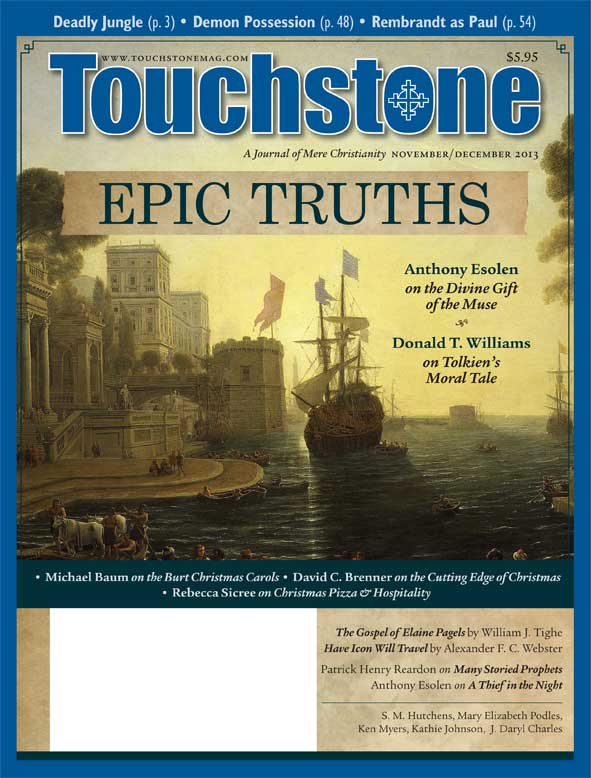View
Grace & Truce
David C. Brenner on the Cutting Edge of God's "Peace on Earth"
Many have heard the message of the angels to the shepherds at Jesus' birth, even apart from church services, thanks to the greeting-card industry and the Charlie Brown Christmas Special. But "peace on earth, goodwill toward men," sufficiently inoffensive to be a perfect holiday greeting in postmodern America, is also misunderstood. The more exact rendering is "peace on earth to men with whom God is pleased." For the peace announced by the angels has a meaning within a larger biblical context, especially Jesus' teachings, that is unlikely to be popularized by the greeting-card industry.
What Peace?
If God intended to usher in peace on earth by sending Jesus, the results so far have been underwhelming. Since Christ's birth, there has been a procession of wars and mass murder, not to mention lesser, everyday acts of violence and mayhem.
So the angels weren't referring to wars and hostility between people. They were referring to the rebellion of man against God. They were declaring peace to human insurgents who were alienated from God's goodness and truth. God's peace treaty extends vertically, between God and man, rather than horizontally, between and among people.
Ironically, the peace that God offers in Jesus often results in even greater alienation in our horizontal relations. Consider Jesus' sobering words: "Do you think I came to bring peace on earth? No, I tell you, but division. From now on, there will be five in one family divided against each other, three against two and two against three" (Luke 12:51–52).
The idea that from birth we are at war with God is an unwelcome one in our self-esteem-obsessed culture. But Jesus' ministry and teachings and the cross he endured make no sense unless this is true. The Apostle Paul didn't mince words when he wrote to the Colossians: "Once you were alienated from God and were enemies in your minds because of your evil behavior" (Col. 1:21). He also described this alienation in Romans: "For although they knew God, they neither glorified him as God nor gave thanks to him, but their thinking became futile and their foolish hearts were darkened" (Rom. 1:21). Paul says that although we all innately know that a righteous God exists, because this is plainly seen in the majesty, complexity, and beauty of creation, and is revealed to us through our God-given sense of right and wrong, we still suppress this discomforting knowledge (cf. Rom. 1:18–20; 3:14).
Since the fall of mankind, we are from birth naturally predisposed against submission to God. We have a deeply rooted spiritual deadness that continually resists God and his ways, and this deadness is revealed in our thoughts, words, and deeds. It prevents us from desiring to know the true God, but it does not suppress our desire for worship. But in our lost condition, we worship, or idolize, anything and everything that isn't God.
When God himself became incarnate, he was rejected. As it is put in the Gospel of John: "This is the verdict: Light has come into the world, but people loved darkness instead of light because their deeds were evil. Everyone who does evil hates the light, and will not come into the light for fear that his deeds will be exposed" (3:19–20). This reminds us of what the Bible says elsewhere, that there is no one who seeks God (cf. Psalms 14:2–3; 53:2–3).
Hence, while Jesus' life and sacrificial death are absolutely necessary for our redemption, they are not sufficient. Absent a heart that believes and trusts God—something no heart is able from birth to do—Christ's death has no salvific effect.
How, then, can anyone be saved? When asked this by his disciples, Jesus' gave a remarkable answer: "With man this is impossible, but with God all things are possible" (Matt. 19:26). God alone is able to transform a darkened rebel heart into one that trusts him for salvation. Which raises a different question: On what grounds or basis does God perform this transformational work that converts rebels? Grace is the usual answer.
David C. Brenner is a writer who lives in northern Virginia with his wife and three sons. He attends Potomac Hills Presbyterian Church in Leesburg.
bulk subscriptions
Order Touchstone subscriptions in bulk and save $10 per sub! Each subscription includes 6 issues of Touchstone plus full online access to touchstonemag.com—including archives, videos, and pdf downloads of recent issues for only $29.95 each! Great for churches or study groups.
Transactions will be processed on a secure server.
more from the online archives
calling all readers
Please Donate
"There are magazines worth reading but few worth saving . . . Touchstone is just such a magazine."
—Alice von Hildebrand
"Here we do not concede one square millimeter of territory to falsehood, folly, contemporary sentimentality, or fashion. We speak the truth, and let God be our judge. . . . Touchstone is the one committedly Christian conservative journal."
—Anthony Esolen, Touchstone senior editor












